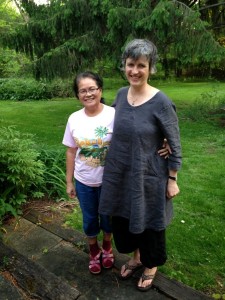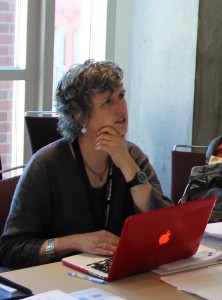Suhyeon Lee (MAIR candidate) interviewed Director of the Transnational NGO Initiative in the Moynihan Institute, Tosca Bruno-van Vijfeijken. Tosca continually brings a wealth of international resources to the PAIA Department and has assisted innumerable students.
Nice to meet you, Ms. Tosca Bruno-van Vijfeijken. Could you introduce yourself?
I am the director of the Transnational NGO (TNGO) Initiative. I engage both in academic work and do a lot of works with NGO practitioners. I have worked on international development and civil society issues for over 25 years. Some people call people like me a ‘pracademic’ and I call myself sometimes jokingly an ‘accidental pracademic’, which means a practitioner who accidently ended up in academia. I didn’t plan to end up in academia, but it happened by chance, and I started enjoying playing a bridge building role between the theory and research around transnational NGOs and the practice of the NGO practitioners who lead and manage these organizations.
Could you explain what you teach at Maxwell School?
I teach Global Governance and Civil Society and in addition to that, I advise a couple of MPA Workshop projects each year. Sometimes, I am an advisor for independent study projects. We also offer opportunities for students to volunteer in our research and practitioner work through the TNGO Initiative.
Can you tell me more about the Global Governance and Civil Society course?
Global Governance and Civil Society is a survey course on the role of civil society in how the world is governed. It is neither a theoretical course nor a management course; it is somewhere in between. We focus on what civil society organizations do and what civil society as a concept stands for. And then we unpack a couple of different sectors: human rights, environment, and conflict resolution, and look at the functions NGOs play. We also look at a number of challenges facing organizations (governance, effectiveness, leadership, coordination, accountability, evaluation and assessment, capacity building issues, etc.).
How did you start your career?
These things, as I sometimes say to students here, are often a mixture of planning, pure coincidence, luck, and unplanned events. I started out working for a year in a small management consulting company in the Netherlands. It was internationally-oriented and focused on small business promotion in developing countries. I was not happy with it, so I moved to a think-tank called the European Center for Development Policies Management (ECDPM). I worked there for four years as a program officer. We focused on governance issues in Sub-Saharan Africa and the Caribbean. And then I wanted to get more field experience which is typically what most young international development practitioners need. I found an opportunity as a UN Volunteer for the UN peacekeeping operations under United Nations Transitional Authority in Cambodia (UNTAC). I was in charge of the preparation for and holding of free and fair elections in one remote district. I also worked for the headquarters of the World Bank for two and a half years, and for four years I was at the World Bank in Hanoi, Vietnam. Those were my sixteen years of international development experience.
As you said, field experience is what most international development young practitioners really need. I also want to have field experience before graduating from Maxwell. Did you have memorable experiences while working in the field in Cambodia?
I think the most memorable experience was that during the year of preparing for the elections, both the Khmer Rouge and bandits engaged in attacks on some foreigners who were in Cambodia as part of the peace keeping operation. Within our large contingent of district electoral supervisors, one person was murdered and four were kidnapped in the last couple of months before elections when political tensions were high. A significant number of Cambodians also died during this tense period. During the elections, when I changed my role from preparation for elections in my district to independent monitoring of polling stations, I found myself for the first time needing a bodyguard because of these political tensions and violence. This was a very new experience for me and it will stay with me since I came from a country (The Netherlands) where governance is not a matter of the power of the gun.

What is the role of NGOs in the development sector in the 21st century?
There will likely always remain a role for TNGOs in humanitarian relief, although government, the private sector and national NGOs are stepping up their roles. And there will continue to be a contingent of small TNGOs that have a classical charity model. Generally speaking, most mid to large size TNGOs still play some roles in direct delivery of services, though this is generally declining, and nowadays often complemented by advocacy and capacity building. Some are evolving their role to that of being a broker and convener between government, the private sector and national NGOs; sometimes, their role evolves to that of knowledge provider. Western TNGOs increasingly work on strengthening their domestic legitimacy as well as playing a stronger role in domestic policy advocacy as well as service delivery work in the countries where they were founded. Because many NGOs by now have been set up by citizens in the countries where formerly primarily western NGOs used to work, these NGOs in the ‘Global South are now able to play the roles that Western or ‘Northern NGOs’ used to, with considerably lower cost models. There is thus more and more pressure on the northern NGOs to get out of the business of delivering services except for humanitarian relief which as I said will always be needed. Therefore, most analysts are foreseeing a big role change in the 21st century.
I’ve seen that you are on the board of InterAction. What is this organization?
InterAction is a membership organization of US international development and relief NGOs and thus plays the role of national platform here in the US. We, as the TNGO initiative, are an associate member, and I am on the board of InterAction as an independent ‘person of stature’. The board position gives me a bird’s eye view of the sector, which is interesting from a research as well as a networking perspective.
What advice you want to give Maxwell students?
I think it is increasingly difficult to find a job in the international NGO sector. In terms of ‘Northern’ NGOs, it’s increasingly hard for American and other western students to find a job because there are more people with a high level of education in the international development sector than there are NGO jobs. In addition, donor levels in certain countries in the ‘North’ are decreasing while there is an increasing supply of students from ‘Global South and East’ countries who also come from good universities. To some extent it is therefore an increasingly crowded and very competitive market for finding a job. You should therefore definitely not put all your eggs in one or two baskets in terms of finding a job. Also, some students tend to come to Maxwell thinking that they want a job at the World Bank, where I used to work, or the UN, and I actually try to make them less single minded about that. Big organizations are not only extremely competitive to get into but also very bureaucratic. If you enter as a junior person, you may find the organization to be very internally oriented – a lot of navel gazing. You also may experience a lot of ‘paper pushing’. It’s not necessarily that interesting to work in such a large, bureaucratic organization at a junior level. If you can work in a small or medium sized organization like an NGO, think rank, social enterprise or impact investor company, I would argue that this will offer you a better job experience with more hands-on work. Later on, you can then be considered for a mid-level job at one of these large organizations. Also, having field experience at the country level continues to be indispensable –without it you will not compete very well in the job market — but at the same time it is increasingly hard to come by.
Overall, something that I want to encourage you to do is to intern in development organizations or complete field work or volunteer experience. And then, do research about a sector you want to work in, look at what organizations and why you want to work for them, and then reach out to them for informational interviews. This will show that you really understand that organization well.
One more thing, keep your eyes on job opportunities in other cities other than Washington, DC and New York because the competition is harsh in these cities and not as many people would apply to jobs in other cities. Power is so distributed in the world that NYC and DC should not be the only choice. Also, don’t just look at NGOs, government, and think tanks. Look at social enterprises, which are corporations that are set up to make profits but invest that profit into social goods, impact investments, and digitally operating campaigns. There are various types of agencies in international development. Look at them in terms of looking for internships and looking for a job.

A previous version of this article stated that Tosca was a “Professor of Practice”, which is inaccurate. This was an oversight on the part of the Editor.
